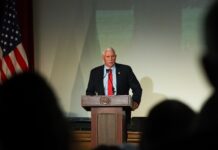Today, as much as lesbian, gay, bisexual, transgender, queer/questioning (LGBTQ+) people have become more broadly accepted, the community still faces discrimination while striving for inclusion and acceptance.
The nomination of Amy Coney Barrett to the Supreme Court and the decisions of President Trump and his administration directly impact the LGBTQ+ community in the United States.
Because October is LGBTQ+ History Month, Lyosha Gorshkov, assistant director of the Pride Center and the Women’s Center, believes we need to educate ourselves more now than ever.
Diversity, equity and inclusion on campus
According to the LGBTQ+ webpage on the SRU website, the university is committed to creating a safer, more welcoming and accepting campus climate for members of the LGBTQ+ community and their allies. The university offers multiple programs, organizations, activities and resources—the Pride Center, RockOUT, Safe Zone, The President’s Commission on Gender Identity and Expression and Sexual Orientation (GIESO), all-gendered restrooms, the Chosen Name Policy and more—to support LGBTQ+ students.
SRU established The Office of Diversity and Equal Opportunity, which was created to assure equal opportunity for all persons, regardless of race, color, religion, creed, disability, ancestry, national origin, age, gender or veteran’s status.
“Slippery Rock University provides an environment that respects, encourages, and promotes the talents and contributions of all,” the SRU webpage for the office said. “[SRU] values a community with a shared sense of purpose, where people demonstrate mutual respect and appreciation.”
In 2016, the university converted single-occupancy restrooms to more than 70 all-gendered restrooms in 35 buildings. These gender-inclusive restrooms benefit many different groups of people, including transgender and gender-nonconforming people.
SRU added the Chosen Name Policy in 2018, which allowed students to chose a first name to identify themselves, rather than using their legal name.
Gorshkov hopes to implement a pronoun policy in the future, as they said we need to hold students and faculty accountable for their actions when they misgender or racially profile others.
“We need to end dead naming practices,” Gorshkov said. “We need to create training on gender sensitivity not only for faculty, staff and students but for all workers who interact with the students.”
The Pride Center is also available to students to encourage awareness and education about the LGBTQ+ community.
“The Pride Center supports and affirms the diverse identities and lives of lesbian, gay, bisexual, transgender and queer/questioning people by the cultivation of a safe, welcoming non-judgmental environment,” the SRU webpage said.
More on-campus resources include Student Support Services, the Student Health Center, and the Student Counseling Center. The webpage also features a list of departments and offices that have at least one Safe Zone trained employee.
The LGBTQ+ webpage displays many external resources available to students.
Safe Zone is a program designed to create a welcoming and supportive campus for LGBTQ+ students and faculty. This program also identifies the members of the university community who are supportive by creating a network of allies.
Safe Zone volunteers participate in training workshops to increase their understanding of LGBTQ+ concerns. The members of this program serve as “an informal resource” and provide support to LGBTQ+ students, according to the webpage.
The webpage tells students to look for Safe Zone symbols throughout campus to help them identify Safe Zone project participants.
As for external resources listed on the webpage, one of many is Parents and Friends of Lesbians and Gays (PFLAG). This resource is the only LGBTQ+ focused organization in Butler County. However, they do have other chapters in western Pennsylvania, including PFLAG Pittsburgh, PFLAG New Castle and PFLAG Greensburg.
Other resources include the Persad Center, a counseling center located in Pittsburgh that serves specifically the LGBTQ+ community; the Delta Foundation of Pittsburgh, an organization that organizes the annual Pride in the Street event in downtown Pittsburgh; the PGH Equality Center, a center that promotes education, advocacy and social justice for all LGBTQ+ people and allies; Pronouns Matter, a resource for personal pronouns and their usage; and The National Center for Transgender Equality, a team of transgender activists that advocate for policy change to advance transgender equality.
As we near the end of LGBTQ+ History Month, Gorshkov wants students to be educated on the history of LGBTQ+ rights and the changes happening right now.
A glimpse at LGBTQ+ history
According to the Planned Parenthood webpage for LGBTQ+ rights, restrictions on LGBTQ+ people’s rights harm more than 10 million Americans who identify as LGBTQ+, along with their friends and families.
In October 2017, the Department of Justice (DOJ) determined that Title VII of the Civil Rights Act of 1964, which prohibits sex discrimination, would no longer protect the rights of transgender people from employment discrimination.
However, on June 16, 2020, the U.S. Supreme Court ruled against the DOJ’s reversal of Title VII. The ruling protects employees from being fired or discriminated against for their gender identity or sexual orientation.
It was revealed in October 2018 that President Donald Trump and his administration are considering narrowing the definition of “sex” in federal civil rights laws. This would eliminate protections for transgender people and expose them to more discrimination, according to Planned Parenthood.
Planned Parenthood said this proposed change could potentially erase all federal recognition of transgender and nonbinary people, including the estimated 1.4 million Americans that do not identify as the gender on their birth certificate.
The Trump administration came up with a rule that would enable healthcare workers to deny healthcare to LGBTQ+ people, blocking them from receiving services like HIV treatments, hormone therapy, abortion and other services that “healthcare workers believe are wrong,” the Planned Parenthood webpage said. This rule is scheduled to take effect on Nov. 22.
The Planned Parenthood webpage details many more instances and rules that restrict people of the LGBTQ+ community in some way. For more information, click here.
Current news involving LGBTQ+ rights
Trump nominated Amy Coney Barrett, a United States federal judge, to fill the Supreme Court vacancy after the passing of Associate Justice Ruth Bader Ginsburg.
Barrett recently moved one step closer to joining the Supreme court, as she received a 6-3 conservative majority vote in the Senate Judiciary Committee meeting Thursday.
Because Barrett is “originalist” or “textualist” in her proceedings, voters are led to believe that if confirmed, she could steer the court in a more conservative direction on various issues, including gun rights, religious freedom, same-sex marriage and the future of Roe v. Wade. This could directly affect members of the LGBTQ+ community.
As the Assistant Director of the Pride Center, Gorshkov said the current political climate is concerning, as it is likely to affect millions of people.
“The sham nomination of Judge Barrett is nothing but a selfish move by the current administration, which has failed to protect its citizens from the pandemic,” Gorshkov said. “While the [COVID-19 pandemic] is getting worse, the Republican senators and Trump are more concerned about their personal agendas rather than the people’s wellbeing.”
Gorshkov added that they consider it to be “necropolitics”, which they define as wanting to intentionally harm your own people, especially those of the LGBTQ+ community.
“The nomination of Judge Barrett is a straight signal to all LGBTIQ+ people, all women and all vulnerable communities to be ready to fight, as your rights are about to be taken away by a bigoted minority of narrow-minded individuals who put their faith before law and justice,” Gorshkov said.
Barrett declined to answer many of the questions asked by the Senate Judiciary Committee throughout the nearly 20 hours of questioning, citing the precedent set by earlier nominees as to why she refused to answer.
“[Barrett] is a real threat,” Gorshkov said. “It’s sad to observe that all that [Ruth Bader Ginsburg] has achieved throughout her amazing career could be thrown away overnight.”
The Senate voted to confirm Barrett to the Supreme Court Monday. This was decided a week before Election Day and 30 days after President Trump nominated Barrett to fill the seat.







